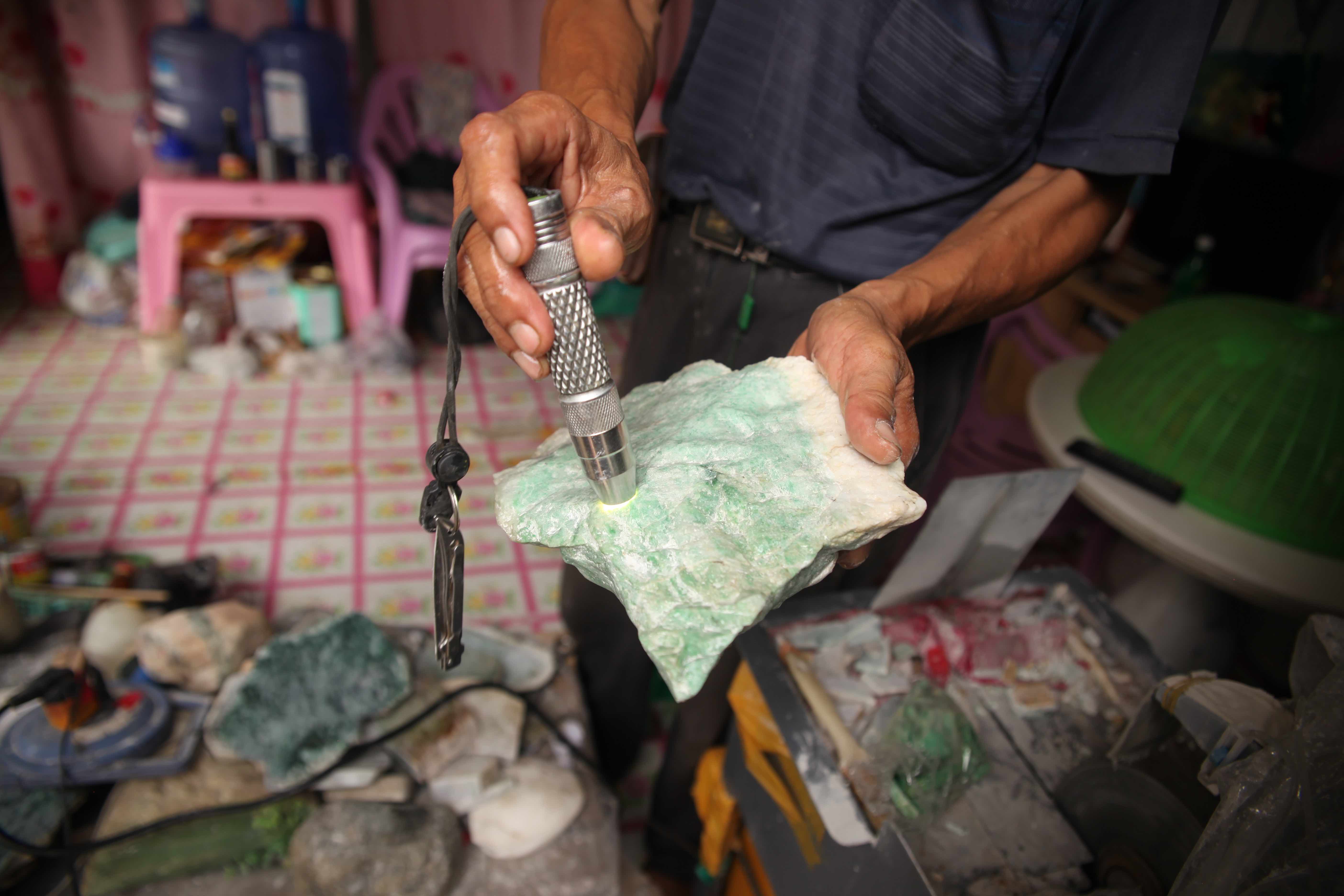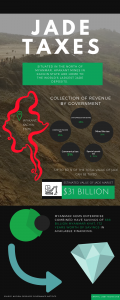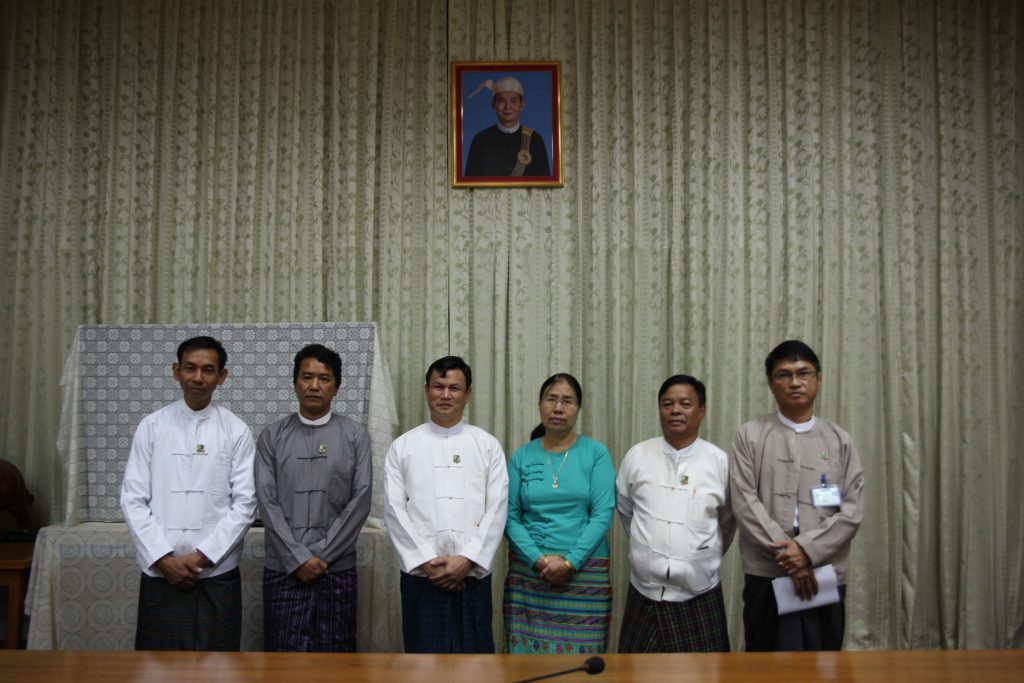From afar it looks like a hollowed out honeycomb, with a scurry of ants.
The craggy mountain is chaotic. Yellow pickup trucks snake up a singular road into the mines alongside excavators dumping soil.
Juts of rock platforms barely a metre wide hold three miners known as “yemases,” jade pickers, looking for stones in the rubble dumped by mining companies.
“The most I can earn in a week is 100,000 kyat (US $64),” says Jaw San Aung, who has worked in the mines for five years.
Days spent in the rain, rummaging through steep mounds of dirt — this is what a day in the life of a jade scavenger looks like.
The fruits of the jade trade are mostly enjoyed by Burmese and Chinese businessmen, the military elite and ethnic armed groups. Few profits return to the Kachin people who live in the land where the jade is found — Hpakant, Kachin State, in northern Myanmar.
Three years since a landmark investigation by watchdog group, Global Witness, that revealed the industry’s worth US 31 billion dollars, questions still abound about what improvements have been made by Aung San Suu Kyi’s government to share those revenues and stop jade being smuggled across the border into China.

-Sitting billions: money rotting in banks-
The peak gem and jade body, Myanmar Gems Enterprise (MGE), has accumulated about 688 billion Myanmar kyat in their bank accounts. And if they didn’t receive another kyat in revenue it would take them about 172 years to spend their savings, based on estimations from their current spending practices.
To put it in perspective, Natural Resources Governance Institute(NRGI) point out the common practice in central banks is to only hold three months’ worth of reserves or private businesses which hold on average 10 percent of their wealth in savings.
NRGI are encouraging MGE to reallocate some of these savings in a more productive use.
“The current existing structure is very centralised, most revenues — from royalties, splits, emporium fees, service fees and commercial tax — all go towards the union government and currently there is no revenue sharing,” says NRGI country director Maw Htun Aung.
In a country of over 55 million people where only one-third have electricity, Kachin human rights defender Stephen Naw Aung says he’d like the royalties from jade to be spent on infrastructure, more schools or healthcare.
-Driven over the border, smuggling continues to thrive along Chinese border-
Chair of the Gems and Jewellery Enterprise in Kachin State, Zay Lwan, believes first and foremost that the government needs to open up the jade market beyond its tight grip in the country’s capital, Naypidaw.
When top class imperial grade stones are found in the mines they are transported to the showroom in Naypidaw and sold at auctions held twice a year.Loosening the monopoly slightly, an emporium has opened in Kachin State’s Myitkyina, yet businesses are only permitted to sell lower class C and D grade jade stones and jewellery. Zay Lwan believes the selling of grade A and B jade in Kachin State’s emporium would benefit the local Kachin people as well as attracting more Chinese buyers to buy legally, as the border is only a few hours away.
“When a gems emporium is held in any region young people get more job opportunities and hotels and restaurants get more customers,” says Zay Lwan overlooking the Myitkyina jade market.

-Tax overhaul-
Many businesses are also calling for the tax scheme to be reviewed and simplified.
When a stone is first found in the mines a flat tax of 20 percent has to be paid to the regional valuing committee. Then a state production share tax of 25 percent on precious stones, a corporate income tax of 25 percent, a commercial tax of 5 percent as well as a special goods tax of 15 to 5 percent. MGE also collects a service fee of 10 to 3 percent for stones sold at Naypidaw’s gems emporium. If a finished product is taken to the international market then the finished piece of jewellery will also be hit with another one percent.
“The higher the taxation, the cost of the item is more expensive which pushes traders to opt the other way and smuggle them,” believes Zay Lwan. He believes if the tax rate is lowered and combined with more regular markets in Myitkyina then the smuggling trade will decrease.
The current valuing system also doesn’t always capture the real value of the jade.
The mine site tax starts at 20 percent for precious stones and is a flat fee. Maw Htun from Natural Resources Governance Institute agrees that the regional valuation committee in charge of assessing these mine site taxes lack the human resources and technical resources.” Jade has an outer crust so there is very hard to know without polishing or cutting to really know the value,” explains Maw Htun.
NRGI recommends the government should reduce this mine site tax but also overhaul the whole valuing system.*
-License freeze-
When Aung San Suu Kyi’s government came into power they froze the issuing of all new licenses in the jade mines. Currently, there are 1,234 total licenses that have been issued to businesses.
The allocation of licenses and monitoring of companies’ conduct inside the mines is overseen by the Myanmar Gem’s Enterprise. “It’s a clear conflict of interest” admits Maw Htun, pointing to their regulatory role as well as their commercial interests, participating in joint ventures in the mines.
When asked if any businesses have been fined for breaching terms in their license agreements MGE insists they regularly hand out fines, but don’t disclose any figures publicly.
Speaking to DVB in Naypidaw, MGE’s Than Zaw Oo says “according to the law if a contractor does mining out of its concessions we take action. . .issuing fine or filing report to the court.”
Yet it’s impossible to know if contractors are still operating in the mines despite their licenses expiring as independent bodies or foreign journalists are not allowed access to Hpakant.
-Steps towards more transparency-
Until recently it’s been controversial to even mention the words Hpakant jade, with its connotation of conflict and murky trading partners tied to the military.
But in 2014 Myanmar signed the global standard of good governance, Extractive Industries Transparency Initiative [EITI], a major step forward in terms of transparency for mining in Myanmar.
Regional EITI Director for South East Asia, Marie Gay Alessandra Ordenes explains that the demand for more information in the jade sector was one of the driving factors for Myanmar to sign up to the EITI process.
“I think the value that we have seen from the EITI process in Myanmar is that it[the government and mining companies] has disclosed a lot of information that haven’t been disclosed previously such as the state participation in the extractive sector,” says Ordenes.

Data on the quantity of jade extracted has been published in the three EITI country reports, but there is still no data on the breakdown of the total amount of jade produced by type or contract disclosure. Publicly available beneficial ownership information is also a grey area.
-Calls for decentralisation and more revenue sharing-
At the very least Myanmar businesses want a small percentage of royalties collected by the union level government from the jade emporiums in Naypidaw.
“In a meeting in Naypyitaw, we demanded a share of one of two pc of tax income from jade enterprise for the environmental conservation of the jade tract and for locals,” said Zay Lwan.

MGE says it’s not up to them, but the Ministry of Mines, and defended that the money passes through them. They also state that the state government is responsible for the allocation of smaller blocks of land inside the mines and to oversee land rehabilitation: “The local government can collect all fees and all taxes from small-scale and artisanal mining,” says Than Zaw Oo.
[related]
As part of the EITI agreement, working committees have been established in Myanmar with stakeholders coming together to discuss the new jade policy.
Khon Ja, an activist from Kachin Peace Network, says she is worried about the future of the mines and whether the discussion from EITI stakeholder meetings will result in action.
“We are still waiting. . .from businesses to the government they need to understand the rights of the local people and to protect the local people and the environment,” says Khon Ja.
For now, Jaw San Aung hopes for less corruption and an end to bribes. “What I want is for the local people [to be] paid the proper value for the stone when we find them in the mines.”



